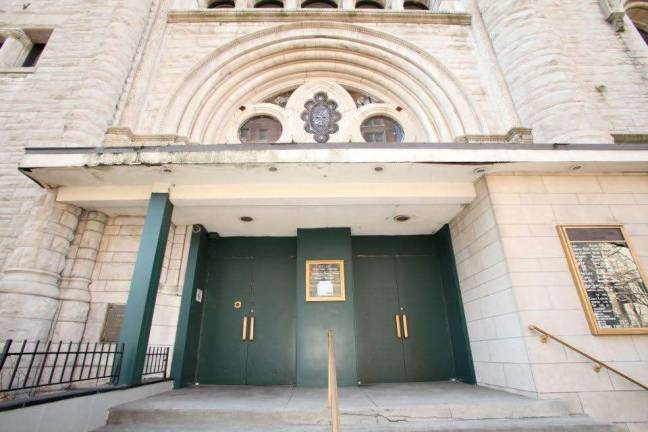A Synagogue Defies the Odds


The West Side Institutional Synagogue has greatly expanded its membership and reach into the community
The Upper West Side is home to many synagogues and churches over a century old, and many have struggled in recent years not only to upkeep their mighty structures but to fill their sanctuaries with members. About five years ago, the West Side Institutional Synagogue was fighting that familiar battle, with only about 30 or 40 members in regular attendance for services on the Sabbath. But thanks to an internal effort and the recent installation of a young, out-of-the-box-thinking rabbi, the synagogue has turned itself around to once again become a vital part of Jewish life in the neighborhood, with 300 to 400 people attending services every week.
"Our synagogue has a very rich history," said Rabbi Joshua Strulowitz in a recent interview. It was first established in 1917 in West Harlem, with the West Side location opening as a second branch in the 1920s. "For a long time it was a very large very significant synagogue. Then in the 60s and on it was in a steady decline."
That decline in membership of Modern Orthodox synagogues during the 1950s and 60s was a national trend too, as a result of an influx of ultra-Orthodox immigrants from Europe after the Holocaust, as well as, on the opposite side, the move of some American Jews toward more liberal Americanized traditions. But Modern Orthodoxy, which aims to integrate Jewish values and observance of Jewish law with modern life, steadily grew over the decades and is now on the rise in New York City.
"Today the synagogue has changed so much, the needs are different," he said. "We've had a rock and roll weekend, a comedy weekend, a sports and Judaism weekend, a lot of kind of high profile events and things that you wouldn't normally see in a synagogue, especially a Modern Orthodox synagogue."
Another unique initiative that WSIS has undergone is a program for engaged couples. Strulowitz explained that the average age of newly engaged couples is younger for Modern Orthodox Jews than for the general population, so there's a need for guidance in many areas of life for these young people.
"The West Side has so many young Jewish couples," Strulowitz said. "Before you're married, you can sit down with a rabbi a few times, we bring in psychologists and counselors and financial planners, just to make sure we're providing the tools they need for a successful marriage."
A recent series of sessions for "Building a Jewish Marriage" includes talks on Mastering Communication in Relationships, a financial concepts seminar with an investment manager, and a talk on Keys to Sexual Fulfillment and Satisfaction with an ob-gyn from Montefiore Medical Center.
WSIS also has a thriving kids program, offering activities and classes for young members, and their sanctuary is kid-friendly, which isn't the case at every synagogue. Strulowitz said this is vital to attracting and keeping young couples who are starting families. They had a street fair to celebrate Israel Independence Day, blocking off W. 76th Street, which brought around 2,000 people.
"We have a nice warm community, people are relaxed," said executive director Abbey Nickinson. "Our services, you can come in and out and it's a place for kids to be. People just feel like they can come and do their own thing."
Part of the appeal, according to Upper West Side resident Roni Gordon, is the synagogue's open and nonjudgmental approach. Gordon is not a regular member of WSIS but started attending services on Jewish holidays and taking Torah classes with Rabbi Strulowitz.
"Usually it's just pro forma, but this rabbi caught me and I wound up in a Torah class. It's very hip, it's not boring," Gordon said. "He makes it very relatable. He makes it relevant to life as we're living it now."
Gordon said she was especially grateful when Strulowitz helped her deal with a painful death in the family, pleasantly surprised that he listened without judgment.
"I'm not a paying member of the synagogue but I've been welcome through all this time, which I think is a very generous wonderful attitude," she said.
"I came to the synagogye when it was virtually empty, in the mid-90s," said Chet Lipson, director of community relations. "There was a controversy about the rabbi at the time, a lot of people left because of that, and we had to start from a really small base."
Around 2002, WSIS began to grow again thanks in part to Rabbi Shlomo Einhorn from LA. "He's the one that really brought the synagogue alive, and he was a charismatic and excellent speaker," said Lipson. When he returned to LA, Rabbi Strulowitz took over and continued the dynamic programming and family-friendly focus.
Strulowitz said that he's always open to new ways to help people and broaden their reach; he's started holding monthly classes in people's apartments, for example, knowing that it's tough for busy people to attend otherwise.
"The more ways we can be helpful, the better. Instead of saying, this is what you need, trying to get you to be a part of it, we say, tell us what you need," Strulowitz said. "I feel that we're in the service industry, we're not in the convincing industry."